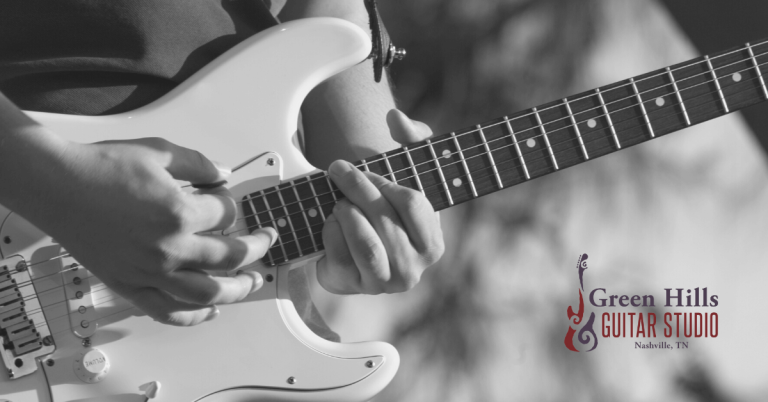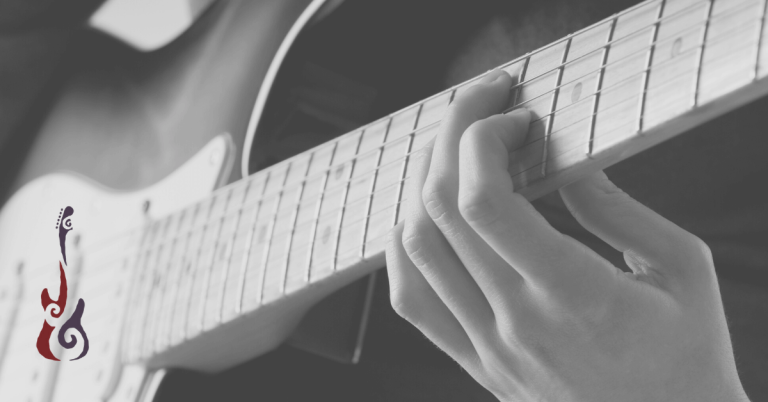10 Tips for Improving Your Guitar Skills
Improving your guitar skills requires dedication, patience, and the right guidance. Whether you’re just starting out or have been playing for years, there’s always room to refine your technique and expand your musical capabilities. This article offers valuable tips designed to help you get better at playing guitar.
From setting clear goals to mastering fundamental techniques, we’ll cover practical strategies and effective practices that will help you progress and achieve your musical aspirations. Let’s dive into these top 10 tips to take your guitar skills to the next level.
1. Setting Clear Goals
Setting clear, attainable goals and tracking your progress can transform your guitar practice from a casual hobby into a structured and rewarding journey. Whether you’re aiming for short-term achievements or working towards long-term aspirations, having a clear plan and regularly reviewing your progress will help you stay motivated when improving your guitar skills.
The Importance of Setting Goals for Guitar Improvement
Goals provide you with direction and a sense of purpose, which are essential for staying motivated and focused on your musical journey. Without specific targets, it can be easy to lose momentum and direction, making progress slow and frustrating.
Short-Term vs. Long-Term Goals for Guitarists
Understanding the difference between short-term and long-term goals is key to effective practice. Short-term goals are more immediate and manageable, such as learning a new chord, mastering a particular riff, or perfecting a song section. These quick wins help build confidence and keep you engaged.
Long-term goals, on the other hand, are broader and more ambitious. They might include mastering an entire song, developing a particular style, or preparing for a live performance. These goals require sustained effort over a longer period and help you see the bigger picture of your musical growth.
Tracking Your Progress
It’s important to track your progress to ensure continuous improvement. Keep a practice journal where you document what you practice each day, note any improvements, and identify areas that need more work. This practice not only helps you stay organized but also allows you to see your progress over time, which can be incredibly motivating.
2. Creating a Consistent Practice Routine
Developing a consistent practice routine is one of the most effective ways of improving your guitar skills. Regular, focused practice not only builds proficiency but also reinforces muscle memory, making it easier to execute techniques effortlessly. A well-structured practice routine ensures that you cover all necessary aspects of playing, leading to well-rounded development.
Consistency is Key in Guitar Practice
Consistency is essential for skill development. Aim to practice regularly, even if it’s just for a short period each day. Consistent practice helps embed techniques into muscle memory, making your playing more fluid and instinctive. Rather than practicing sporadically for long periods, daily practice sessions, even if brief, can yield better results over time.
How to Structure Your Guitar Practice Sessions
A well-structured practice session is crucial for making the most of your time and improving your guitar skills. Divide your practice time into different segments to cover various aspects of playing:
- Warm-ups: Begin with simple exercises to get your fingers moving and prevent injury. This could include basic finger stretches, scales, and arpeggios.
- Technique Exercises: Spend time on specific techniques you want to improve, such as alternate picking, fingerpicking, or hammer-ons and pull-offs.
- Learning New Material: Dedicate a portion of your practice to learning new chords, riffs, or songs. This will keep your practice engaging and help you expand your repertoire.
- Revisiting Old Pieces: Spend time playing songs or pieces you’ve already learned. This helps reinforce what you’ve previously practiced and ensures you retain your skills.
Balancing Different Guitar Techniques
To become a versatile guitarist, it’s important to balance your practice to include a variety of techniques. This approach not only keeps practice interesting but also ensures comprehensive skill development. Here’s how to balance different techniques in your routine:
- Strumming: Practice different strumming patterns and techniques to improve your rhythm and timing.
- Picking Techniques: Work on fingerpicking exercises and other guitar picking techniques to enhance your dexterity and control.
- Soloing: Spend time soloing to develop your improvisation skills and speed.
- Chord Transitions: Practice switching between chords smoothly and quickly to improve your overall playing fluidity.
3. Mastering the Basic Guitar Skills
Mastering the basics is the foundation upon which all advanced guitar techniques are built. By focusing on essential chord shapes, scales, and finger exercises, you’ll develop the skills needed to play a wide variety of music and improve your overall proficiency.
Essential Chord Shapes Every Guitarist Should Know
Mastering basic chord shapes, such as learning triads, is fundamental to playing the guitar. Start with open chords, which are chords played using open strings and are typically found at the first few frets.
These chords are the building blocks of many songs and are relatively easy to play. Practice transitioning smoothly between open chords to build your confidence and coordination.
Once you’re comfortable with open chords, move on to barre chords. Barre chords are more challenging because they require you to press down multiple strings with one finger, typically the index finger.
These chords are movable, meaning you can shift the same shape up and down the neck to play different chords. Practice both major and minor barre chords, and focus on transitioning smoothly between them.
Learning and Practicing Guitar Scales
Scales are the foundation of melodies and solos in guitar playing. Learning major and minor scales will improve your understanding of musical theory and help you develop finger dexterity.
Start with the major scale, which is a sequence of notes that follows a specific pattern of whole and half steps. Once you’re comfortable with the major scale, move on to the minor scale, which has a different pattern and a distinct sound.
Practice scales using a metronome to ensure you’re playing in time and gradually increase the speed as you become more proficient. Focus on playing each note cleanly and evenly.
Scales and modes are not only great for finger dexterity but also for understanding the fretboard layout, which will help you navigate the guitar more efficiently.
Effective Finger Exercises for Guitarists
Incorporating finger exercises into your routine is essential for strengthening your fingers and improving coordination. Chromatic runs are a great starting point.
These exercises involve playing each note sequentially on a string before moving to the next string. This helps build finger independence and control.
Spider exercises are another effective practice. These involve more complex patterns that require your fingers to move in non-linear ways, helping to develop coordination and strength.
Regularly practicing these exercises will make your fingers more agile and responsive, which is crucial for both rhythm and lead guitar playing.
4. Learning Music Theory for Guitar
Understanding music theory is a game-changer for guitarists. It provides a deeper understanding of how music works, making it easier to create, improvise, and play more complex pieces.
By learning about diatonic harmony, you’ll gain insights into scales, modes, chord progressions, and the ability to read sheet music, all of which will significantly enhance your guitar playing.
Understanding Scales and Modes for Guitar Improvisation
Knowledge of scales and modes enhances your improvisation skills, allowing you to create more exciting and dynamic solos. When you understand the scale or mode a piece of music is based on, you can improvise more effectively, choosing notes that fit harmoniously with the underlying chords. This understanding makes your improvisation sound more intentional and musically coherent.
Mastering Chord Progressions in Different Genres
Chord progressions are the backbone of many songs and genres. Studying common progressions used in various genres helps you anticipate changes and play more fluidly.
For example, the I-IV-V progression is prevalent in rock, blues, and pop music, while jazz often uses ii-V-I progressions.
Understanding chord progressions allows you to recognize patterns and quickly adapt to new songs. It also helps you in writing your own music, as you’ll have a repertoire of progressions to draw from.
Practice playing these progressions in different keys and with various rhythms to get a feel for how they can be applied across different musical styles.
Benefits of Reading Sheet Music for Guitarists
Learning to read sheet music opens up a vast array of musical possibilities. It enables you to play classical pieces, jazz standards, and complex compositions that are not easily transcribed into tablature.
Reading music also gives you a better understanding of rhythm, timing, and dynamics.
While tablature is a useful tool for guitarists, sheet music provides a more comprehensive view of the music, including note duration and articulation. This skill allows you to explore a wider range of music and enhances your overall musicianship.
Start with simple pieces and gradually work your way up to more complex compositions to build your reading skills.
5. Utilizing Online Guitar Resources
The internet is a treasure trove of resources for guitarists of all levels. From video lessons and tutorials to interactive tabs and vibrant communities, there’s a wealth of information available at your fingertips.
Finding Quality Guitar Lessons and Tutorials Online
When searching for lessons, look for reputable guitar instructors with a clear teaching style. Reviews and recommendations from other guitarists can help you find the most effective and engaging content.
Make the most of these resources by following along with lessons, practicing regularly, and incorporating what you learn into your playing.
Using Guitar Tabs and Backing Tracks for Practice
Guitar tabs and backing tracks are invaluable tools for learning new songs and honing your skills. Tabs provide a visual guide, showing exactly where to place your fingers on the fretboard.
Backing tracks simulate a live performance environment, allowing you to practice playing along with a band. This helps improve your timing, rhythm, and overall musicality.
Many online platforms offer backing tracks in various styles and keys, allowing users to practice improvisation and soloing in a supportive context.
Joining Online Guitar Communities
Engaging with online guitar communities can provide a sense of camaraderie and support. Forums, social media groups, and dedicated websites like Reddit’s r/Guitar or The Gear Page are great places to share tips, seek advice, and connect with other guitarists. These communities are often filled with experienced players who can offer valuable insights and encouragement.
6. Playing Along with Songs to Improve Guitar Skills
Playing along with songs is one of the most enjoyable and effective ways to improve your guitar skills. It not only makes practice sessions more engaging but also helps you develop crucial musical abilities such as timing, rhythm, and ear training.
Selecting Songs to Match Your Guitar Skill Level
Choosing the right songs to practice is essential for steady progress. Start with songs that match your current skill level to ensure you can play them confidently. As you improve, gradually increase the difficulty of the songs you select.
This approach keeps practice sessions enjoyable and challenging, providing a sense of accomplishment as you master each piece. Playing familiar tunes can also boost your motivation and make practice more fun.
Following Guitar Tabs Accurately
To learn songs accurately, follow along with guitar tabs. Tabs provide a clear visual guide, showing where to place your fingers on the fretboard. However, don’t rely solely on the tabs; use your ears as well.
Listening closely to the song will help you capture the nuances of timing and rhythm that tabs alone cannot convey. Developing your listening skills is crucial for any musician, as it enables you to play more expressively and intuitively.
Improve Your Rhythm and Timing
Playing along with songs is an excellent way to improve your rhythm and timing. Focus on staying in sync with the music, ensuring that your strumming or picking matches the beat.
Experiment with different strumming patterns and techniques to add variety and complexity to your playing. Practicing with songs also helps you internalize the rhythm, making it easier to keep time even when playing solo or in different musical contexts.
7. Recording and Reviewing Your Guitar Playing
Recording and reviewing your guitar practice is an invaluable method for accelerating your progress and improving your guitar skills. It allows you to objectively assess your playing, track your progress, and identify areas that need more focus.
The Benefits of Recording Your Guitar Practice
Recording your practice sessions offers numerous benefits. It provides a way to review your playing objectively, helping you hear nuances and errors you might not notice in real-time.
By listening critically to recordings, you can identify specific areas that need improvement, such as timing, tone, or technique.
Additionally, keeping recordings over time allows you to track your progress, offering motivation as you hear how much you’ve improved.
Simple Tools for Recording Guitar Practice
You don’t need advanced equipment to start recording your practice sessions. Simple tools like a smartphone or a digital recorder are sufficient for capturing your playing.
As you become more serious about recording, you might consider investing in an audio interface and recording software for higher-quality recordings.
These tools offer greater control over sound quality and provide additional features that can enhance your recording experience.
How to Analyze Your Guitar Performance
Analyzing your recordings is a critical step in the improvement process. When listening to your recordings, focus on identifying mistakes or areas needing work.
Pay attention to timing, rhythm, tone, and technique. Note any inconsistencies or difficulties you encounter and make a plan to address these issues in your next practice sessions.
Regularly analyzing your recordings will help you make targeted adjustments to your practice routine, leading to more efficient and effective improvement.
8. Exploring Different Music Genres on Guitar
Exploring different music genres is an excellent way to improve your guitar skills and broaden your musical horizons. Each genre has its own set of challenges, articulations, and techniques that are invaluable when improving your guitar skills and overall playing ability.
Expanding Your Guitar Repertoire with New Genres
Exploring different music genres is an excellent way to expand your guitar repertoire and enhance your playing skills. Each genre offers unique elements—such as distinct chord progressions, rhythms, and techniques—that can add depth and versatility to your musical abilities.
Diversifying Your Musical Experience
Experimenting with genres like blues, jazz, rock, classical, and others exposes you to a wide range of musical structures and styles. Blues might introduce you to bending and sliding techniques, while jazz could offer complex chord voicings and improvisation skills. Rock emphasizes power chords and energetic riffs, whereas classical guitar focuses on fingerpicking and precise articulation.
Enhancing Musical Versatility
By trying out new genres, you not only expand your repertoire but also become a more versatile guitarist. This versatility allows you to adapt to different musical settings and collaborate with musicians across various genres. It keeps your practice sessions fresh and engaging, continually presenting new challenges and learning opportunities.
Staying Engaged and Challenged
Incorporating a variety of genres into your practice routine prevents stagnation and keeps you motivated. Each new style you explore brings its own set of challenges, ensuring that you remain engaged and constantly improving. This diversity in your practice can make learning music more enjoyable and fulfilling as you discover new aspects of guitar playing that you might not have encountered otherwise.
9. Taking Care of Your Guitar
Proper guitar maintenance is essential for ensuring your instrument remains in top condition and performs at its best. Regular care and attention can prevent damage, improve sound quality, and extend the life of your guitar. By following a few simple maintenance practices, you can keep your guitar in optimal shape and enjoy playing it for years to come.
Regular Guitar Maintenance Tips
Regular maintenance is key to keeping your guitar in excellent condition. Start by cleaning your guitar after each use to remove sweat, oil, and dirt that can accumulate on the strings and body. Use a soft cloth to wipe down the strings, fretboard, and body.
Change your strings regularly, as old strings can lose their tone and become difficult to play. The frequency of string changes depends on how often you play, but a good rule of thumb is to replace them every few months.
Additionally, inspect your guitar for any issues that need addressing, such as loose hardware, worn frets, or cracks in the body. Regular maintenance not only keeps your guitar sounding great but also helps you catch and fix problems before they become serious.
Proper Storage for Guitars
Proper storage is crucial to avoid damage and maintain your guitar’s condition. Always store your instrument in a guitar stand or case when not in use. A case provides the best protection, especially if you need to transport your guitar.
Keep your guitar in a temperature-controlled environment. Extreme temperatures and humidity can cause the wood to warp or crack, affecting both the playability and sound quality. Ideally, store your guitar in a room with stable temperature and humidity levels to prevent these issues.
Upgrading Guitar Components for Better Performance
Upgrading certain components of your guitar can significantly enhance its performance and sound quality. Consider replacing pickups if you want to improve your guitar’s tone or explore different sounds. High-quality pickups can make a noticeable difference, especially if your current ones are basic or worn out.
Upgrading tuners can improve the tuning stability and make it easier to keep your guitar in tune. This is particularly important for performance and recording situations.
Lastly, experiment with different types of strings to find ones that best suit your playing style and desired sound. Strings come in various materials and gauges, and finding the right ones can enhance your playing experience and tone.
10. Joining a Guitar Community
Joining a guitar community is a fantastic way to enhance your musical journey. Being part of a community provides opportunities for learning, collaboration, and mutual support.
Whether you connect with fellow guitarists locally or online, engaging with a community can motivate you, offer new perspectives, and help you grow as a musician.
At Green Hills Guitar Studio, we encourage our students to immerse themselves in the guitar community to maximize their learning experience.
Finding Local Guitar Groups and Classes
One of the best ways to connect with other guitarists is by joining local guitar groups or classes. These groups offer a supportive environment where you can share your passion for music, learn from others, and improve your skills.
Playing with others provides new perspectives and opportunities for collaboration, whether it’s through group lessons, jam sessions, or performance opportunities.
Green Hills Guitar Studio offers a variety of classes and group activities designed to help you connect with other guitar enthusiasts and grow together.
Engaging in Online Guitar Forums
In addition to local groups, online forums and social media groups dedicated to guitar playing are excellent resources for connecting with other musicians. These platforms allow you to seek advice, share experiences, and stay motivated.
Engaging in discussions, asking questions, and participating in challenges can significantly enhance your learning process.
Online communities also provide access to a wealth of information and resources that can help you overcome specific challenges and achieve your goals.
Collaborating with Other Musicians
Collaborating with other musicians is a powerful way to broaden your musical experience. Playing in a band or jamming with friends not only enhances your technical skills but also fosters creativity and improvisation. Collaboration pushes you to adapt to different playing styles, genres, and musical ideas, enriching your own playing.
The Coda: Improving Your Guitar Skills
Improving your guitar skills is rewarding but requires dedication and the right approach. You can get better at guitar and enjoy the process by setting clear goals, maintaining a consistent practice routine, and exploring various resources.
Remember to stay motivated, seek support from fellow guitarists, and, most importantly, have fun with your guitar.
Ready to take your guitar skills to the next level? Sign up for online or in-person guitar lessons at Green Hills Guitar Studio in Nashville. Let’s make music together!
FAQs About Improving Your Guitar Playing
How often should I practice guitar?
Aim to practice guitar daily, even if it’s just for 15-30 minutes. Consistent, structured practice sessions are more important than long, infrequent sessions.
What’s the best way to improve finger strength?
Incorporate finger exercises like chromatic runs, spider exercises, and scale practice into your routine. Regular playing will naturally build strength over time.
Do I need to learn music theory to play guitar?
While not mandatory, learning music theory significantly enhances your understanding of the instrument and improves your playing, especially for composing and improvisation.
What type of guitar should a beginner start with?
Beginners often start with an acoustic guitar for its simplicity, though some prefer electric guitars depending on their musical interests. Choose one that feels comfortable and suits your style.
How can I stay motivated to practice?
Set clear, achievable goals, mix up your practice routine, play along with songs you enjoy, and join a community for support and inspiration.
What’s the benefit of recording my practice sessions?
Recording allows you to objectively review your playing, track progress, and identify areas for improvement, leading to more focused and effective practice sessions.






